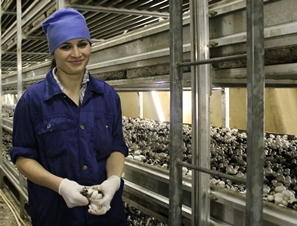 Though gaining a greater profile, mushrooms remain woefully under-appreciated. Neither plant nor animal, these fungi are high in cruelty-free protein and key vitamins like niacin, B12, and D. They also provide crucial amino acids and may boost the immune system, reduce the risk of cancer, and increase longevity.
Though gaining a greater profile, mushrooms remain woefully under-appreciated. Neither plant nor animal, these fungi are high in cruelty-free protein and key vitamins like niacin, B12, and D. They also provide crucial amino acids and may boost the immune system, reduce the risk of cancer, and increase longevity.
This helps explain why the Georgian producer Tetri Kudi, after conquering its domestic market, is looking to export this wonder food to neighboring countries.
Boosted by a $1.5 million loan from IFC – its first investment in mushrooms – Tetri Kudi is expanding capacity more than 20 percent and hopes to begin exporting to the large Russian market. The growth potential is real: consumers there and in other neighboring countries consume an average of 1 kilogram of mushrooms per year – half as much as Americans.
“This partnership with IFC is helping us modernize our production and become a legitimate exporter,” said Ivane Ioseliani, Director of Tetri Kudi. “We have already started exporting oyster mushrooms to Armenia and are in negotiations to start exports to Russia.”
When Tetri Kudi launched three years ago, nearly 90 percent of Georgia’s fresh mushrooms were imported. As a result of high prices, consumption was low. But Tetri Kudi's fresh domestic product cut prices by more than a third and Georgia’s consumption more than doubled.
Now Tetri Kudi holds around 80 percent of the fresh mushroom market. There are still opportunities to grow. But access to long-term finance is rare, particularly for agribusinesses.
“Despite Georgia’s rich agricultural traditions, the country has become an importer in recent years,” said Thomas Lubeck, IFC Regional Manager for the South Caucasus. “The opportunity exists for local producers to replace imports, as well as become exporters and our cooperation with Georgia’s leading mushroom producer is a nice example of that.”
Being a market leader, Tetri Kudi also helps develop small mushroom production greenhouses in rural areas by selling spores and raw materials and providing free consultation.
“We support small greenhouses because we are interested in boosting the development of the whole mushroom sector in Georgia,” said Ioseliani. “We believe our production can benefit from that.”
It can also benefit from increased capacity, and put Georgia-produced oyster mushrooms, champignons, and portobellos in markets and restaurants across Russia and other neighboring countries.